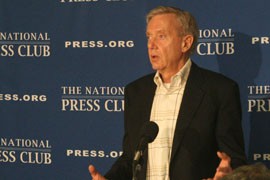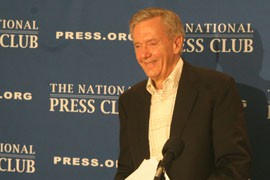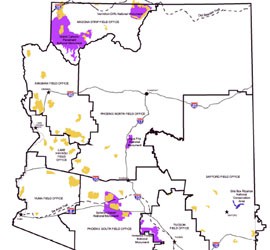Cronkite News has moved to a new home at cronkitenews.azpbs.org. Use this site to search archives from 2011 to May 2015. You can search the new site for current stories.
Babbitt calls on president, Congress to focus on conservation efforts
WASHINGTON – Former Arizona Gov. Bruce Babbitt called for more active land preservation by the federal government Tuesday, criticizing what he called Washington’s neglect of public lands.
Babbitt, who was also Interior secretary in the Clinton administration, suggested that President Barack Obama bypass Congress and set aside one acre of land for every acre of public land leased to “big oil.”
“Somehow our public conservation has crumbled and collapsed,” Babbitt said.
Babbitt noted that the government leased more than 6 million acres of public land for oil and gas production during Obama’s first four years in office, but did not add any acres during that time. He called it a continuation of a decline that began in 2001 with the Bush administration.
“We should pause to ask, ‘What about conservation and where is the balance?’” Babbitt said at a National Press Club news conference.
But a current Interior Department official insisted that the government’s approach is balanced – while a property rights activist said it’s already tilted too far toward conservation.
The Department of the Interior has improved conservation policies and invested in protecting and restoring land and water that supports local economies, said spokeswoman Jessica Kershaw.
“Our guiding principle from the beginning has been a balanced approach to achieving an all-of-the-above energy strategy while also taking important steps to preserve our treasured landscapes, like the Grand Canyon and the Everglades, and partnering with local stakeholders to support their conservation priorities,” Kershaw said in an emailed statement.
But Chuck Cushman, executive director of the American Land Rights Association, said there is a limit to the amount of space that can be preserved without affecting the livelihood of humans.
“At some point there has to be a limit to a national park,” Cushman said. “You don’t want to damage the Grand Canyon but at the same time, we need to know where our minerals are, and in case of emergency be able to go get them.”
He said Babbitt held back U.S. energy production when he was Interior secretary, and several industries could suffer from increased conservation now. Miners and ranchers rely heavily on federal lands and when the government limits the use of those lands, it affects people economically, Cushman said.
“What Bruce Babbitt wants would be very bad for the country right now,” he said. “The federal bureaucracy is like a noose around the neck of people who need to use federal lands.”
Cushman also worries that conservation lands are increasingly closed off from people.
“There has to be a way for people to live and work and play and have access and at the same time protect natural areas,” Cushman said.
But Babbitt said the long-term benefit of preserving more land – any land – is more beneficial to future generations than the short-term economic boost from oil and gas production.
He also acknowledged the need for recreational access to public lands, saying the economic benefit from recreation and increased renewable energy would offset any loss of revenue from decreased fossil fuel sales.
Babbitt called this a “commonsense” solution to both sustaining energy resources and revitalizing the economy, because outdoor recreation creates as many jobs as the energy industry – if not more.
Babbitt’s advice to the president included setting aside 4 million acres now to be permanently preserved in its natural state and then setting aside one new acre for every acre the government leases for oil and gas production.
Babbitt said Obama should simply make the designations under the Antiquities Act, because “unlike his predecessors, he can’t rely on anything from Congress.” And if the president needs any ideas about which lands to preserve, he can look to the 30 conservation bills that got stuck in the last Congress, Babbitt said.
Making concessions will not get the president anywhere in advancing his stated goal to combat global warming, Babbitt said.
“The best defense of the Antiquities Act is to use it,” he said.









